Sunday, March 7, 2021
FOR MY AUNT - by Angie M Flores
WHAT "MOTHER" MEANS - by Karl Fuchs
 |
Thursday, March 4, 2021
THE DARLING - by ANTON P. CHEKOV
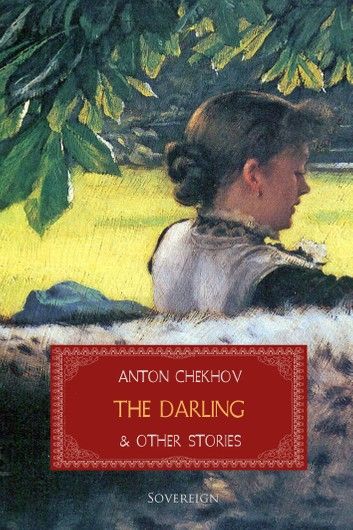
Olenka, the daughter
of the retired collegiate assessor Plemyanikov, was sitting on the back
door steps of her house doing nothing. It was hot, the flies were
nagging and teasing, and it was pleasant to think that it would soon be
evening. Dark rain clouds were gathering from the east, wafting a breath
of moisture every now and then.
Kukin, who roomed in
the wing of the same house, was standing in the yard looking up at the
sky. He was the manager of the Tivoli, an open-air theatre.
“Again,” he said
despairingly. “Rain again. Rain, rain, rain! Every day rain! As though
to spite me. I might as well stick my head into a noose and be done with
it. It’s ruining me. Heavy losses every day!” He wrung his hands, and
continued, addressing Olenka: “What a life, Olga Semyonovna! It’s enough
to make a man weep. He works, he does his best, his very best, he
tortures himself, he passes sleepless nights, he thinks and thinks and
thinks how to do everything just right. And what’s the result? He gives
the public the best operetta, the very best pantomime, excellent
artists. But do they want it? Have they the least appreciation of it?
The public is rude. The public is a great boor. The public wants a
circus, a lot of nonsense, a lot of stuff. And there’s the weather.
Look! Rain almost every evening. It began to rain on the tenth of May,
and it’s kept it up through the whole of June. It’s simply awful. I
can’t get any audiences, and don’t I have to pay rent? Don’t I have to
pay the actors?”
The next day towards evening the clouds gathered again, and Kukin said with an hysterical laugh:
“Oh, I don’t care.
Let it do its worst. Let it drown the whole theatre, and me, too. All
right, no luck for me in this world or the next. Let the actors bring
suit against me and drag me to court. What’s the court? Why not Siberia
at hard labour, or even the scaffold? Ha, ha, ha!”
It was the same on the third day.
Olenka listened to
Kukin seriously, in silence. Sometimes tears would rise to her eyes. At
last Kukin’s misfortune touched her. She fell in love with him. He was
short, gaunt, with a yellow face, and curly hair combed back from his
forehead, and a thin tenor voice. His features puckered all up when he
spoke. Despair was ever inscribed on his face. And yet he awakened in
Olenka a sincere, deep feeling.
She was always
loving somebody. She couldn’t get on without loving somebody. She had
loved her sick father, who sat the whole time in his armchair in a
darkened room, breathing heavily. She had loved her aunt, who came from
Brianska once or twice a year to visit them. And before that, when a
pupil at the progymnasium, she had loved her French teacher. She was a
quiet, kind-hearted, compassionate girl, with a soft gentle way about
her. And she made a very healthy, wholesome impression. Looking at her
full, rosy cheeks, at her soft white neck with the black mole, and at
the good naïve smile that always played on her face when something
pleasant was said, the men would think, “Not so bad,” and would smile
too; and the lady visitors, in the middle of the conversation, would
suddenly grasp her hand and exclaim, “You darling!” in a burst of
delight.
The house, hers by
inheritance, in which she had lived from birth, was located at the
outskirts of the city on the Gypsy Road, not far from the Tivoli. From
early evening till late at night she could hear the music in the theatre
and the bursting of the rockets; and it seemed to her that Kukin was
roaring and battling with his fate and taking his chief enemy, the
indifferent public, by assault. Her heart melted softly, she felt no
desire to sleep, and when Kukin returned home towards morning, she
tapped on her window-pane, and through the curtains he saw her face and
one shoulder and the kind smile she gave him.
He proposed to her,
and they were married. And when he had a good look of her neck and her
full vigorous shoulders, he clapped his hands and said:
“You darling!”
He was happy. But it rained on their wedding-day, and the expression of despair never left his face.
They got along well
together. She sat in the cashier’s box, kept the theatre in order, wrote
down the expenses, and paid out the salaries. Her rosy cheeks, her kind
naïve smile, like a halo around her face, could be seen at the
cashier’s window, behind the scenes, and in the café. She began to tell
her friends that the theatre was the greatest, the most important, the
most essential thing in the world, that it was the only place to obtain
true enjoyment in and become humanised and educated.
“But do you suppose
the public appreciates it?” she asked. “What the public wants is the
circus. Yesterday Vanichka and I gave Faust Burlesqued, and almost all
the boxes were empty. If we had given some silly nonsense, I assure you,
the theatre would have been overcrowded. To-morrow we’ll put Orpheus in
Hades on. Do come.”
Whatever Kukin said
about the theatre and the actors, she repeated. She spoke, as he did,
with contempt of the public, of its indifference to art, of its
boorishness. She meddled in the rehearsals, corrected the actors,
watched the conduct of the musicians; and when an unfavourable criticism
appeared in the local paper, she wept and went to the editor to argue
with him.
The actors were fond
of her and called her “Vanichka and I” and “the darling.” She was sorry
for them and lent them small sums. When they bilked her, she never
complained to her husband; at the utmost she shed a few tears.
In winter, too, they
got along nicely together. They leased a theatre in the town for the
whole winter and sublet it for short periods to a Little Russian
theatrical company, to a conjuror and to the local amateur players.
Olenka grew fuller
and was always beaming with contentment; while Kukin grew thinner and
yellower and complained of his terrible losses, though he did fairly
well the whole winter. At night he coughed, and she gave him raspberry
syrup and lime water, rubbed him with eau de Cologne, and wrapped him up
in soft coverings.
“You are my precious sweet,” she said with perfect sincerity, stroking his hair. “You are such a dear.”
At Lent he went to
Moscow to get his company together, and, while without him, Olenka was
unable to sleep. She sat at the window the whole time, gazing at the
stars. She likened herself to the hens that are also uneasy and unable
to sleep when their rooster is out of the coop. Kukin was detained in
Moscow. He wrote he would be back during Easter Week, and in his letters
discussed arrangements already for the Tivoli. But late one night,
before Easter Monday, there was an ill-omened knocking at the
wicket-gate. It was like a knocking on a barrel—boom, boom, boom! The
sleepy cook ran barefooted, plashing through the puddles, to open the
gate.
“Open the gate, please,” said some one in a hollow bass voice. “I have a telegram for you.”
Olenka had received
telegrams from her husband before; but this time, somehow, she was
numbed with terror. She opened the telegram with trembling hands and
read:
“Ivan Petrovich died suddenly to-day. Awaiting propt orders for wuneral Tuesday.”
That was the way the
telegram was written—“wuneral”—and another unintelligible word—“propt.”
The telegram was signed by the manager of the opera company.
“My dearest!” Olenka
burst out sobbing. “Vanichka, my dearest, my sweetheart. Why did I ever
meet you? Why did I ever get to know you and love you? To whom have you
abandoned your poor Olenka, your poor, unhappy Olenka?”
Kukin was buried on
Tuesday in the Vagankov Cemetery in Moscow. Olenka returned home on
Wednesday; and as soon as she entered her house she threw herself on her
bed and broke into such loud sobbing that she could be heard in the
street and in the neighbouring yards.
“The darling!” said the neighbours, crossing themselves. “How Olga Semyonovna, the poor darling, is grieving!”
Three months
afterwards Olenka was returning home from mass, downhearted and in deep
mourning. Beside her walked a man also returning from church, Vasily
Pustovalov, the manager of the merchant Babakayev’s lumber-yard. He was
wearing a straw hat, a white vest with a gold chain, and looked more
like a landowner than a business man.
“Everything has its
ordained course, Olga Semyonovna,” he said sedately, with sympathy in
his voice. “And if any one near and dear to us dies, then it means it
was God’s will and we should remember that and bear it with submission.”
He took her to the
wicket-gate, said good-bye and went away. After that she heard his
sedate voice the whole day; and on closing her eyes she instantly had a
vision of his dark beard. She took a great liking to him. And evidently
he had been impressed by her, too; for, not long after, an elderly
woman, a distant acquaintance, came in to have a cup of coffee with her.
As soon as the woman was seated at table she began to speak about
Pustovalov—how good he was, what a steady man, and any woman could be
glad to get him as a husband. Three days later Pustovalov himself paid
Olenka a visit. He stayed only about ten minutes, and spoke little, but
Olenka fell in love with him, fell in love so desperately that she did
not sleep the whole night and burned as with fever. In the morning she
sent for the elderly woman. Soon after, Olenka and Pustovalov were
engaged, and the wedding followed.
Pustovalov and
Olenka lived happily together. He usually stayed in the lumber-yard
until dinner, then went out on business. In his absence Olenka took his
place in the office until evening, attending to the book-keeping and
despatching the orders.
“Lumber rises twenty
per cent every year nowadays,” she told her customers and
acquaintances. “Imagine, we used to buy wood from our forests here. Now
Vasichka has to go every year to the government of Mogilev to get wood.
And what a tax!” she exclaimed, covering her cheeks with her hands in
terror. “What a tax!”
She felt as if she
had been dealing in lumber for ever so long, that the most important and
essential thing in life was lumber. There was something touching and
endearing in the way she pronounced the words, “beam,” “joist,” “plank,”
“stave,” “lath,” “gun-carriage,” “clamp.” At night she dreamed of whole
mountains of boards and planks, long, endless rows of wagons conveying
the wood somewhere, far, far from the city. She dreamed that a whole
regiment of beams, 36 ft. x 5 in., were advancing in an upright position
to do battle against the lumber-yard; that the beams and joists and
clamps were knocking against each other, emitting the sharp crackling
reports of dry wood, that they were all falling and then rising again,
piling on top of each other. Olenka cried out in her sleep, and
Pustovalov said to her gently:
“Olenka my dear, what is the matter? Cross yourself.”
Her husband’s
opinions were all hers. If he thought the room was too hot, she thought
so too. If he thought business was dull, she thought business was dull.
Pustovalov was not fond of amusements and stayed home on holidays; she
did the same.
“You are always either at home or in the office,” said her friends. “Why don’t you go to the theatre or to the circus, darling?”
“Vasichka and I
never go to the theatre,” she answered sedately. “We have work to do, we
have no time for nonsense. What does one get out of going to theatre?”
On Saturdays she and
Pustovalov went to vespers, and on holidays to early mass. On returning
home they walked side by side with rapt faces, an agreeable smell
emanating from both of them and her silk dress rustling pleasantly. At
home they drank tea with milk-bread and various jams, and then ate pie.
Every day at noontime there was an appetising odour in the yard and
outside the gate of cabbage soup, roast mutton, or duck; and, on fast
days, of fish. You couldn’t pass the gate without being seized by an
acute desire to eat. The samovar was always boiling on the office table,
and customers were treated to tea and biscuits. Once a week the married
couple went to the baths and returned with red faces, walking side by
side.
“We are getting
along very well, thank God,” said Olenka to her friends. “God grant that
all should live as well as Vasichka and I.”
When Pustovalov went
to the government of Mogilev to buy wood, she was dreadfully homesick
for him, did not sleep nights, and cried. Sometimes the veterinary
surgeon of the regiment, Smirnov, a young man who lodged in the wing of
her house, came to see her evenings. He related incidents, or they
played cards together. This distracted her. The most interesting of his
stories were those of his own life. He was married and had a son; but he
had separated from his wife because she had deceived him, and now he
hated her and sent her forty rubles a month for his son’s support.
Olenka sighed, shook her head, and was sorry for him.
“Well, the Lord keep
you,” she said, as she saw him off to the door by candlelight. “Thank
you for coming to kill time with me. May God give you health. Mother in
Heaven!” She spoke very sedately, very judiciously, imitating her
husband. The veterinary surgeon had disappeared behind the door when she
called out after him: “Do you know, Vladimir Platonych, you ought to
make up with your wife. Forgive her, if only for the sake of your son.
The child understands everything, you may be sure.”
When Pustovalov
returned, she told him in a low voice about the veterinary surgeon and
his unhappy family life; and they sighed and shook their heads, and
talked about the boy who must be homesick for his father. Then, by a
strange association of ideas, they both stopped before the sacred
images, made genuflections, and prayed to God to send them children.
And so the
Pustovalovs lived for full six years, quietly and peaceably, in perfect
love and harmony. But once in the winter Vasily Andreyich, after
drinking some hot tea, went out into the lumber-yard without a hat on
his head, caught a cold and took sick. He was treated by the best
physicians, but the malady progressed, and he died after an illness of
four months. Olenka was again left a widow.
“To whom have you
left me, my darling?” she wailed after the funeral. “How shall I live
now without you, wretched creature that I am. Pity me, good people, pity
me, fatherless and motherless, all alone in the world!”
She went about
dressed in black and weepers, and she gave up wearing hats and gloves
for good. She hardly left the house except to go to church and to visit
her husband’s grave. She almost led the life of a nun.
It was not until six
months had passed that she took off the weepers and opened her
shutters. She began to go out occasionally in the morning to market with
her cook. But how she lived at home and what went on there, could only
be surmised. It could be surmised from the fact that she was seen in her
little garden drinking tea with the veterinarian while he read the
paper out loud to her, and also from the fact that once on meeting an
acquaintance at the post-office, she said to her:
“There is no proper
veterinary inspection in our town. That is why there is so much disease.
You constantly hear of people getting sick from the milk and becoming
infected by the horses and cows. The health of domestic animals ought
really to be looked after as much as that of human beings.”
She repeated the
veterinarian’s words and held the same opinions as he about everything.
It was plain that she could not exist a single year without an
attachment, and she found her new happiness in the wing of her house. In
any one else this would have been condemned; but no one could think ill
of Olenka. Everything in her life was so transparent. She and the
veterinary surgeon never spoke about the change in their relations. They
tried, in fact, to conceal it, but unsuccessfully; for Olenka could
have no secrets. When the surgeon’s colleagues from the regiment came to
see him, she poured tea, and served the supper, and talked to them
about the cattle plague, the foot and mouth disease, and the municipal
slaughter houses. The surgeon was dreadfully embarrassed, and after the
visitors had left, he caught her hand and hissed angrily:
“Didn’t I ask you
not to talk about what you don’t understand? When we doctors discuss
things, please don’t mix in. It’s getting to be a nuisance.”
She looked at him in astonishment and alarm, and asked:
“But, Volodichka, what am I to talk about?”
And she threw her arms round his neck, with tears in her eyes, and begged him not to be angry. And they were both happy.
But their happiness
was of short duration. The veterinary surgeon went away with his
regiment to be gone for good, when it was transferred to some distant
place almost as far as Siberia, and Olenka was left alone.
Now she was
completely alone. Her father had long been dead, and his armchair lay in
the attic covered with dust and minus one leg. She got thin and homely,
and the people who met her on the street no longer looked at her as
they had used to, nor smiled at her. Evidently her best years were over,
past and gone, and a new, dubious life was to begin which it were
better not to think about.
In the evening
Olenka sat on the steps and heard the music playing and the rockets
bursting in the Tivoli; but it no longer aroused any response in her.
She looked listlessly into the yard, thought of nothing, wanted nothing,
and when night came on, she went to bed and dreamed of nothing but the
empty yard. She ate and drank as though by compulsion.
And what was worst
of all, she no longer held any opinions. She saw and understood
everything that went on around her, but she could not form an opinion
about it. She knew of nothing to talk about. And how dreadful not to
have opinions! For instance, you see a bottle, or you see that it is
raining, or you see a muzhik riding by in a wagon. But what the bottle
or the rain or the muzhik are for, or what the sense of them all is, you
cannot tell—you cannot tell, not for a thousand rubles. In the days of
Kukin and Pustovalov and then of the veterinary surgeon, Olenka had had
an explanation for everything, and would have given her opinion freely
no matter about what. But now there was the same emptiness in her heart
and brain as in her yard. It was as galling and bitter as a taste of
wormwood.
Gradually the town
grew up all around. The Gypsy Road had become a street, and where the
Tivoli and the lumber-yard had been, there were now houses and a row of
side streets. How quickly time flies! Olenka’s house turned gloomy, the
roof rusty, the shed slanting. Dock and thistles overgrew the yard.
Olenka herself had aged and grown homely. In the summer she sat on the
steps, and her soul was empty and dreary and bitter. When she caught the
breath of spring, or when the wind wafted the chime of the cathedral
bells, a sudden flood of memories would pour over her, her heart would
expand with a tender warmth, and the tears would stream down her cheeks.
But that lasted only a moment. Then would come emptiness again, and the
feeling, What is the use of living? The black kitten Bryska rubbed up
against her and purred softly, but the little creature’s caresses left
Olenka untouched. That was not what she needed. What she needed was a
love that would absorb her whole being, her reason, her whole soul, that
would give her ideas, an object in life, that would warm her aging
blood. And she shook the black kitten off her skirt angrily, saying:
“Go away! What are you doing here?”
And so day after day, year after year not a single joy, not a single opinion. Whatever Marva, the cook, said was all right.
One hot day in July,
towards evening, as the town cattle were being driven by, and the whole
yard was filled with clouds of dust, there was suddenly a knocking at
the gate. Olenka herself went to open it, and was dumbfounded to behold
the veterinarian Smirnov. He had turned grey and was dressed as a
civilian. All the old memories flooded into her soul, she could not
restrain herself, she burst out crying, and laid her head on Smirnov’s
breast without saying a word. So overcome was she that she was totally
unconscious of how they walked into the house and seated themselves to
drink tea.
“My darling!” she murmured, trembling with joy. “Vladimir Platonych, from where has God sent you?”
“I want to settle
here for good,” he told her. “I have resigned my position and have come
here to try my fortune as a free man and lead a settled life. Besides,
it’s time to send my boy to the gymnasium. He is grown up now. You know,
my wife and I have become reconciled.”
“Where is she?” asked Olenka.
“At the hotel with the boy. I am looking for lodgings.”
“Good gracious,
bless you, take my house. Why won’t my house do? Oh, dear! Why, I won’t
ask any rent of you,” Olenka burst out in the greatest excitement, and
began to cry again. “You live here, and the wing will be enough for me.
Oh, Heavens, what a joy!”
The very next day
the roof was being painted and the walls whitewashed, and Olenka, arms
akimbo, was going about the yard superintending. Her face brightened
with her old smile. Her whole being revived and freshened, as though she
had awakened from a long sleep. The veterinarian’s wife and child
arrived. She was a thin, plain woman, with a crabbed expression. The boy
Sasha, small for his ten years of age, was a chubby child, with clear
blue eyes and dimples in his cheeks. He made for the kitten the instant
he entered the yard, and the place rang with his happy laughter.
“Is that your cat, auntie?” he asked Olenka. “When she has little kitties, please give me one. Mamma is awfully afraid of mice.”
Olenka chatted with
him, gave him tea, and there was a sudden warmth in her bosom and a soft
gripping at her heart, as though the boy were her own son.
In the evening, when he sat in the dining-room studying his lessons, she looked at him tenderly and whispered to herself:
“My darling, my pretty. You are such a clever child, so good to look at.”
“An island is a tract of land entirely surrounded by water,” he recited.
“An island is a
tract of land,” she repeated—the first idea asseverated with conviction
after so many years of silence and mental emptiness.
She now had her
opinions, and at supper discussed with Sasha’s parents how difficult the
studies had become for the children at the gymnasium, but how, after
all, a classical education was better than a commercial course, because
when you graduated from the gymnasium then the road was open to you for
any career at all. If you chose to, you could become a doctor, or, if
you wanted to, you could become an engineer.
Sasha began to go to
the gymnasium. His mother left on a visit to her sister in Kharkov and
never came back. The father was away every day inspecting cattle, and
sometimes was gone three whole days at a time, so that Sasha, it seemed
to Olenka, was utterly abandoned, was treated as if he were quite
superfluous, and must be dying of hunger. So she transferred him into
the wing along with herself and fixed up a little room for him there.
Every morning Olenka
would come into his room and find him sound asleep with his hand tucked
under his cheek, so quiet that he seemed not to be breathing. What a
shame to have to wake him, she thought.
“Sashenka,” she said sorrowingly, “get up, darling. It’s time to go to the gymnasium.”
He got up, dressed,
said his prayers, then sat down to drink tea. He drank three glasses of
tea, ate two large cracknels and half a buttered roll. The sleep was not
yet out of him, so he was a little cross.
“You don’t know your
fable as you should, Sashenka,” said Olenka, looking at him as though
he were departing on a long journey. “What a lot of trouble you are. You
must try hard and learn, dear, and mind your teachers.”
“Oh, let me alone, please,” said Sasha.
Then he went down
the street to the gymnasium, a little fellow wearing a large cap and
carrying a satchel on his back. Olenka followed him noiselessly.
“Sashenka,” she called.
He looked round and
she shoved a date or a caramel into his hand. When he reached the street
of the gymnasium, he turned around and said, ashamed of being followed
by a tall, stout woman:
“You had better go home, aunt. I can go the rest of the way myself.”
She stopped and stared after him until he had disappeared into the school entrance.
Oh, how she loved
him! Not one of her other ties had been so deep. Never before had she
given herself so completely, so disinterestedly, so cheerfully as now
that her maternal instincts were all aroused. For this boy, who was not
hers, for the dimples in his cheeks and for his big cap, she would have
given her life, given it with joy and with tears of rapture. Why? Ah,
indeed, why?
When she had seen
Sasha off to the gymnasium, she returned home quietly, content, serene,
overflowing with love. Her face, which had grown younger in the last
half year, smiled and beamed. People who met her were pleased as they
looked at her.
“How are you, Olga Semyonovna, darling? How are you getting on, darling?”
“The gymnasium
course is very hard nowadays,” she told at the market. “It’s no joke.
Yesterday the first class had a fable to learn by heart, a Latin
translation, and a problem. How is a little fellow to do all that?”
And she spoke of the teacher and the lessons and the text-books, repeating exactly what Sasha said about them.
At three o’clock
they had dinner. In the evening they prepared the lessons together, and
Olenka wept with Sasha over the difficulties. When she put him to bed,
she lingered a long time making the sign of the cross over him and
muttering a prayer. And when she lay in bed, she dreamed of the
far-away, misty future when Sasha would finish his studies and become a
doctor or an engineer, have a large house of his own, with horses and a
carriage, marry and have children. She would fall asleep still thinking
of the same things, and tears would roll down her cheeks from her closed
eyes. And the black cat would lie at her side purring: “Mrr, mrr, mrr.”
Suddenly there was a
loud knocking at the gate. Olenka woke up breathless with fright, her
heart beating violently. Half a minute later there was another knock.
“A telegram from
Kharkov,” she thought, her whole body in a tremble. “His mother wants
Sasha to come to her in Kharkov. Oh, great God!”
She was in despair.
Her head, her feet, her hands turned cold. There was no unhappier
creature in the world, she felt. But another minute passed, she heard
voices. It was the veterinarian coming home from the club.
“Thank God,” she
thought. The load gradually fell from her heart, she was at ease again.
And she went back to bed, thinking of Sasha who lay fast asleep in the
next room and sometimes cried out in his sleep:
“I’ll give it to you! Get away! Quit your scrapping!”
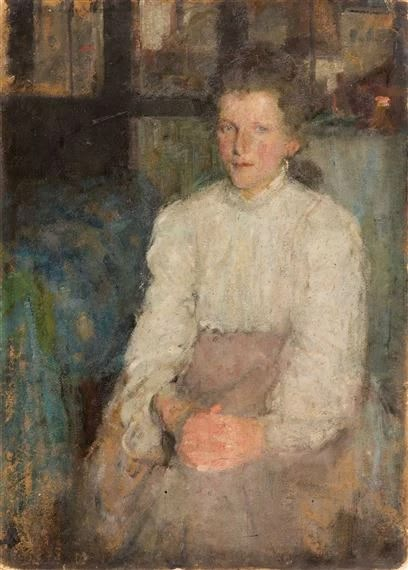
Wednesday, March 3, 2021
THE OAK - by Alfred Lord Tennyson
Friday, February 26, 2021
THE CHIEF MATE - by James Russell Lowell
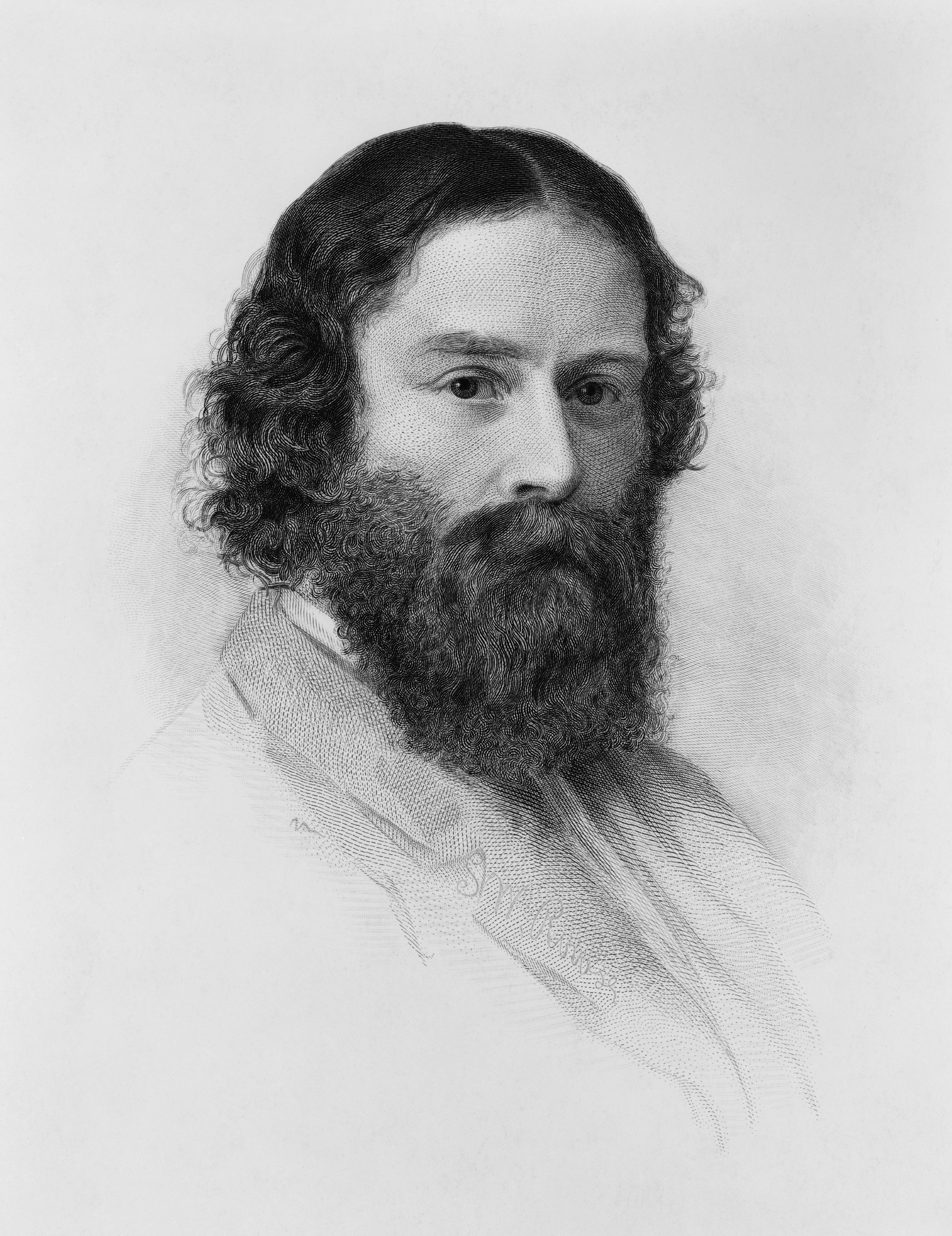
James
Russell Lowell ( 1819 – 1891) was an American Romantic poet, critic,
editor, and diplomat. He is associated with the Fireside Poets, a group
of New England writers who were among the first American poets that
rivaled the popularity of British poets. These writers usually used
conventional forms and meters in their poetry, making them suitable for
families entertaining at their fireside.
THE CHIEF MATE
My
first glimpse of Europe was the shore of Spain. Since we got into the
Mediterranean, we have been becalmed for some days within easy view of
it. All along are fine mountains, brown all day, and with a bloom on
them at sunset like that of a ripe plum. Here and there at their feet
little white towns are sprinkled along the edge of the water, like the
grains of rice dropped by the princess in the story. Sometimes we see
larger buildings on the mountain slopes, probably convents. I sit and
wonder whether the farther peaks may not be the Sierra Morena (the rusty
saw) of Don Quixote. I resolve that they shall be, and am content.
Surely latitude and longitude never showed me any particular respect,
that I should be over scrupulous with them.
But
after all, Nature, though she may be more beautiful, is nowhere so
entertaining as in man, and the best thing I have seen and learned at
sea is our Chief Mate. My first acquaintance with him was made over my
knife, which he asked to look at, and, after a critical examination,
handed back to me, saying, "I shouldn't wonder if that 'ere was a good
piece o' stuff." Since then he has transferred a part of his regard for
my knife to its owner. I like folks who like an honest bit of steel, and
take no interest whatever in "your Raphaels, Correggios, and stuff."
There is always more than the average human nature in the man who has a
hearty sympathy with iron. It is a manly metal, with no sordid
associations like gold and silver. My sailor fully came up to my
expectation on further acquaintance. He might well be called an old salt
who had been wrecked on Spitzbergen before I was born. He was not an
American, but I should never have guessed it by his speech, which was
the purest Cape Cod, and I reckon myself a good taster of dialects. Nor
was he less Americanized in all his thoughts and feelings, a singular
proof of the ease with which our omnivorous country assimilates foreign
matter, provided it be Protestant, for he was a man ere he became an
American citizen. He used to walk the deck with his hands in his
pockets, in seeming abstraction, but nothing escaped his eyes. How he
saw I could never make out, though I had a theory that it was with his
elbows. After he had taken me (or my knife) into his confidence, he took
care that I should see whatever he deemed of interest to a landsman.
Without looking up, he would say, suddenly, "There's a whale blowin'
clearn up to win'ard," or, "Them's porpises to leeward: that means
change o' wind." He is as impervious to cold as a polar bear, and paces
the deck during his watch much as one of those yellow hummocks goes
slumping up and down his cage. On the Atlantic, if the wind blew a gale
from the northeast, and it was cold as an English summer, he was sure to
turn out in a calico shirt and trousers, his furzy brown chest half
bare, and slippers, without stockings. But lest you might fancy this to
have chanced by defect of wardrobe, he comes out in a monstrous
pea-jacket here in the Mediterranean, when the evening is so hot that
Adam would have been glad to leave off his fig-leaves. "It's a kind o'
damp and unwholesome in these ere waters," he says, evidently regarding
the Midland Sea as a vile standing pool, in comparison with the bluff
ocean. At meals he is superb, not only for his strengths, but his
weaknesses. He has somehow or other come to think me a wag, and if I ask
him to pass the butter, detects an occult joke, and laughs as much as
is proper for a mate. For you must know that our social hierarchy on
shipboard is precise, and the second mate, were he present, would only
laugh half as much as the first. Mr. X. always combs his hair, and works
himself into a black frock coat (on Sundays he adds a waist coat)
before he comes to meals, sacrificing himself nobly and painfully to the
social proprieties. The second mate, on the other hand, who eats after
us, enjoys the privilege of shirt-sleeves, and is, I think, the happier
man of the two. We do not have seats above and below the salt, as in old
time, but above and below the white sugar. Mr. X. always takes brown
sugar, and it is delightful to see how he ignores the existence of
certain delicates which he considers above his grade, tipping his head
on one side with an air of abstraction so that he may seem not to deny
himself, but to omit helping himself from inadvertence, or absence of
mind. At such times he wrinkles his forehead in a peculiar manner,
inscrutable at first as a cuneiform inscription, but as easily read
after you once get the key. The sense of it is something like this: "I,
X., know my place, a height of wisdom attained by few. Whatever you may
think, I do not see that currant jelly, nor that preserved grape.
Especially a kind Providence has made me blind to bowls of white sugar,
and deaf to the pop of champagne corks. It is much that a merciful
compensation gives me a sense of the dingier hue of Havana, and the
muddier gurgle of beer. Are there potted meats? My physician has ordered
me three pounds of minced salt-junk at every meal." There is such a
thing, you know, as a ship's husband: X. is the ship's poor relation.
As
I have said, he takes also a below-the-white-sugar interest in the
jokes, laughing by precise point of compass, just as he would lay the
ship's course, all yawing being out of the question with his scrupulous
decorum at the helm. Once or twice I have got the better of him, and
touched him off into a kind of compromised explosion, like that of damp
fireworks, that splutter and simmer a little, and then go out with
painful slowness and occasional relapses. But his fuse is always of the
unwillingest, and you must blow your match, and touch him off again and
again with the same joke. Or rather, you must magnetize him many times
to get him en rapport with a jest. This once accomplished, you have him,
and one bit of fun will last the whole voyage. He prefers those of one
syllable, the a-b abs of humor. The gradual fattening of the steward, a
benevolent mulatto with whiskers and earrings, who looks as if he had
been meant for a woman, and had become a man by accident, as in some of
those stories by the elder physiologists, is an abiding topic of
humorous comment with Mr. X. "That 'ere stooard," he says, with a brown
grin like what you might fancy on the face of a serious and aged seal,
"'s agittin' as fat's a porpis. He was as thin's a shingle when he come
aboord last v'yge. Them trousis'll bust yit. He don't darst take 'em off
nights, for the whole ship's company couldn't git him into 'em agin."
And then he turns aside to enjoy the intensity of his emotion by
himself, and you hear at intervals low rumblings, an indigestion of
laughter. He tells me of St. Elmo's fires, Marvell's corposants, though
with him the original corpos santos has suffered a sea change, and
turned to comepleasants, pledges of fine weather. I shall not soon find a
pleasanter companion. It is so delightful to meet a man who knows just
what you do not. Nay, I think the tired mind finds something in plump
ignorance like what the body feels in cushiony moss. Talk of the
sympathy of kindred pursuits! It is the sympathy of the upper and nether
mill-stones, both forever grinding the same grist, and wearing each
other smooth. One has not far to seek for book-nature, artist-nature,
every variety of superinduced nature, in short, but genuine human-nature
is hard to find. And how good it is! Wholesome as a potato, fit company
for any dish. The free masonry of cultivated men is agreeable, but
artificial, and I like better the natural grip with which manhood
recognizes manhood.
X.
has one good story, and with that I leave him, wishing him with all my
heart that little inland farm at last which is his calenture as he paces
the windy deck. One evening, when the clouds looked wild and whirling, I
asked X. if it was coming on to blow. "No, I guess not," said he;
"bumby the moon'll be up, and scoff away that 'ere loose stuff." His
intonation set the phrase "scoff away" in quotation-marks as plain as
print. So I put a query in each eye, and he went on. "Ther' was a Dutch
cappen onct, an' his mate come to him in the cabin, where he sot takin'
his schnapps, an' says, 'Cappen, it's agittin' thick, an' looks kin' o'
squally, hedn't we's good's shorten sail?' 'Gimmy my alminick,' says the
cappen. So he looks at it a spell, an' says he, 'The moon's due in
less'n half an hour, an' she'll scoff away ev'ythin' clare agin.' So the
mate he goes, an' bumby down he comes agin, an' says, 'Cappen, this
'ere's the allfiredest, powerfullest moon 't ever you did see. She's
scoffed away the main-togallants'l, an' she's to work on the foretops'l
now. Guess you'd better look in the alminick agin, and fin' out when
this moon sets.' So the cappen thought 'twas 'bout time to go on deck.
Dreadful slow them Dutch cappens be." And X. walked away, rumbling
inwardly, like the rote of the sea heard afar.

Wednesday, February 24, 2021
WITCH AND WITCHCRAFT - by Prabir Gayen
|
I OPENED A BOOK - by Julia Donaldson
| |
Tuesday, February 23, 2021
American artist - COLLIN BOGLE
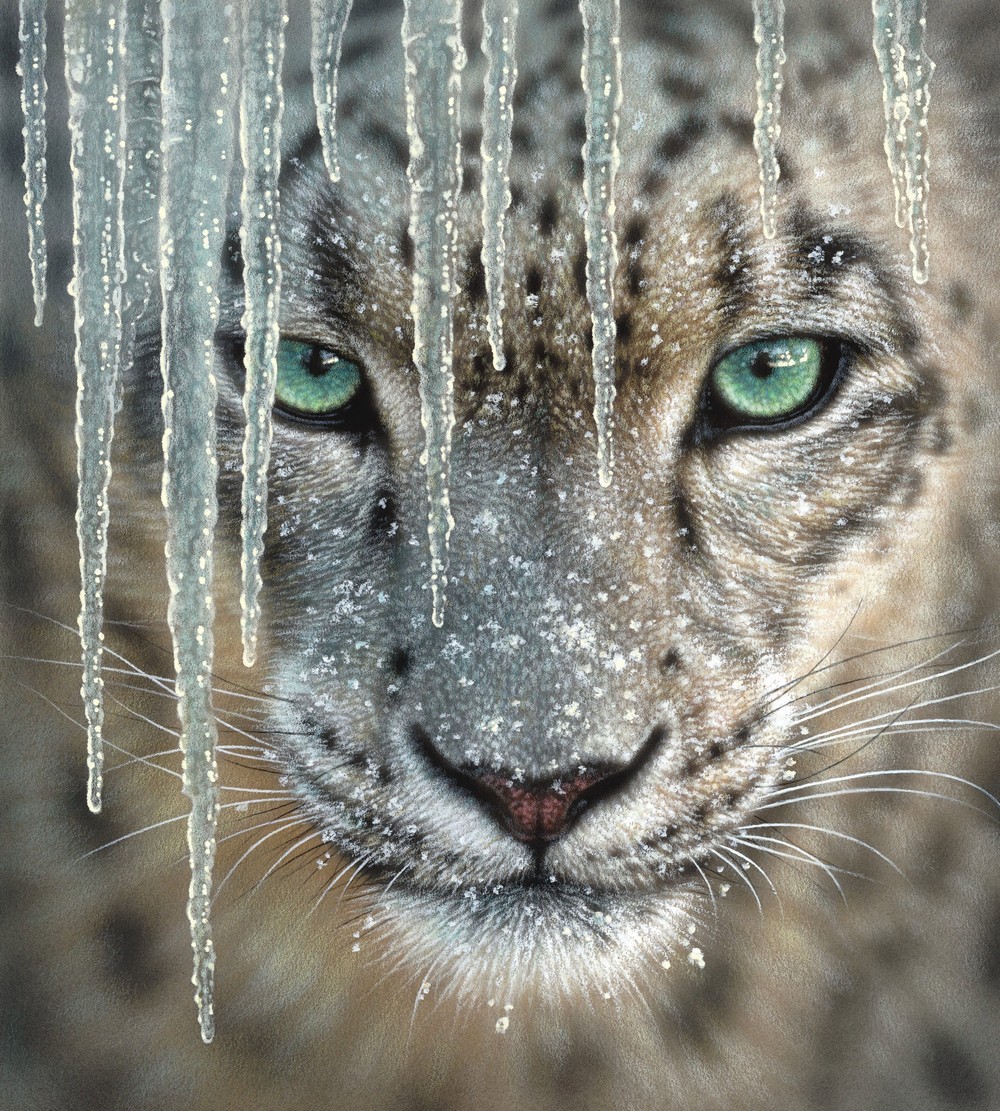
American
artist Collin Bogle uses crayons, water-based pastels and airbrushes to
paint realistic animal portraits. The 47-year-old spends anywhere from
two weeks to two months painstakingly creating each piece of art.
“I started painting realistic scenes in elementary school and am
inspired by animals because of their uniqueness and beauty. I love to
create these vivid, intimate experiences that cannot be reproduced in
the wild, and I strive to show something lively and exciting. which the
viewer usually does not see. I especially love wolves, bears and big
cats; this is a good chance to see them up close without the threat of
being eaten. "
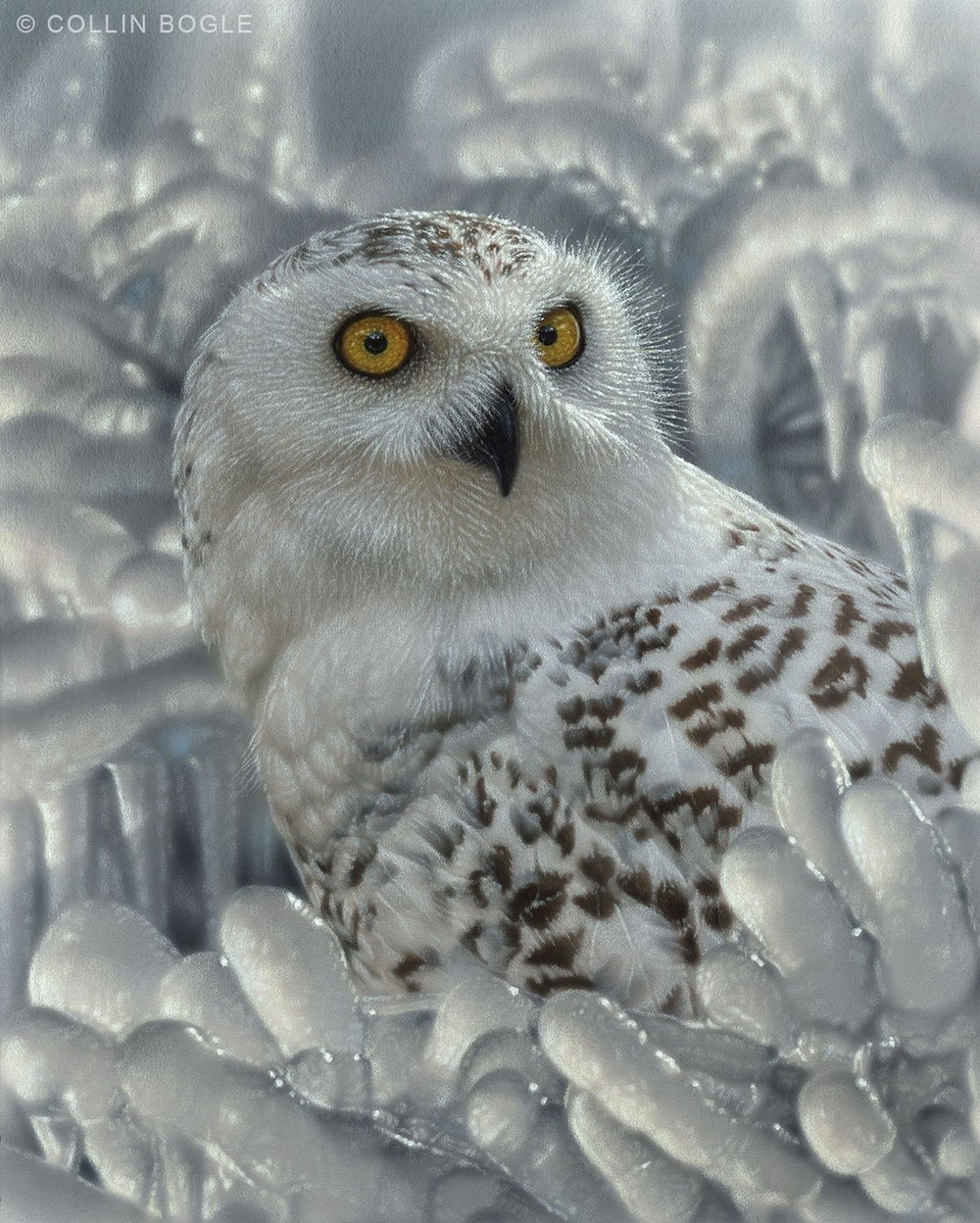







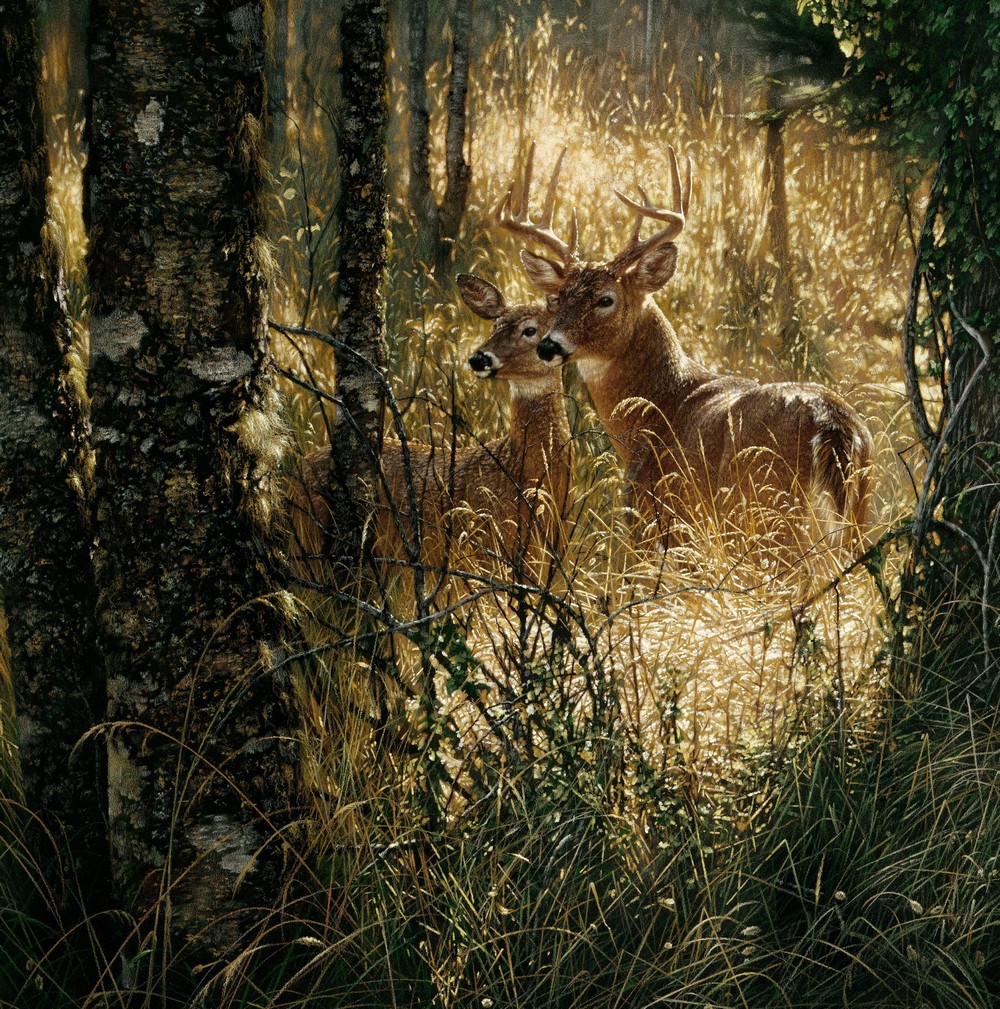
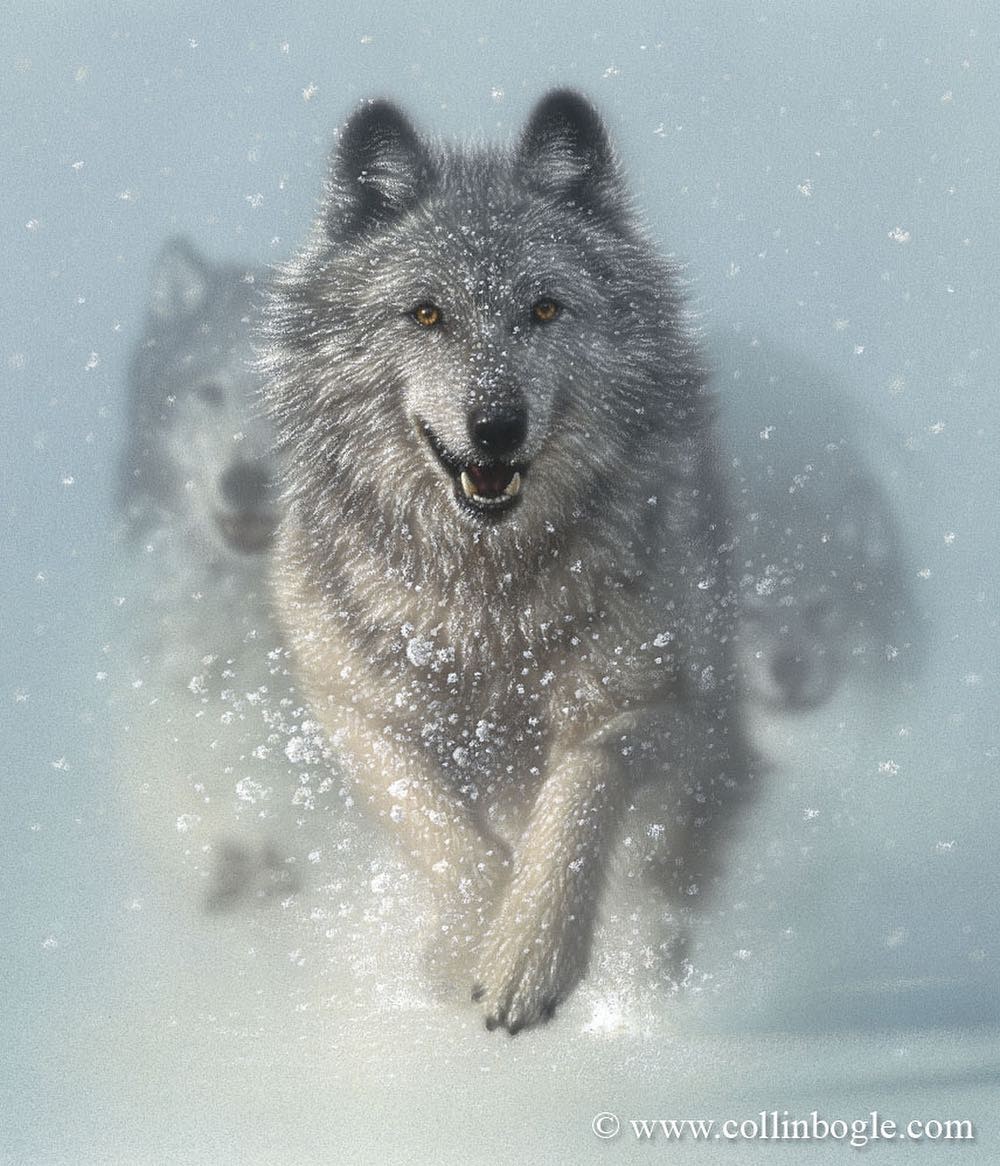
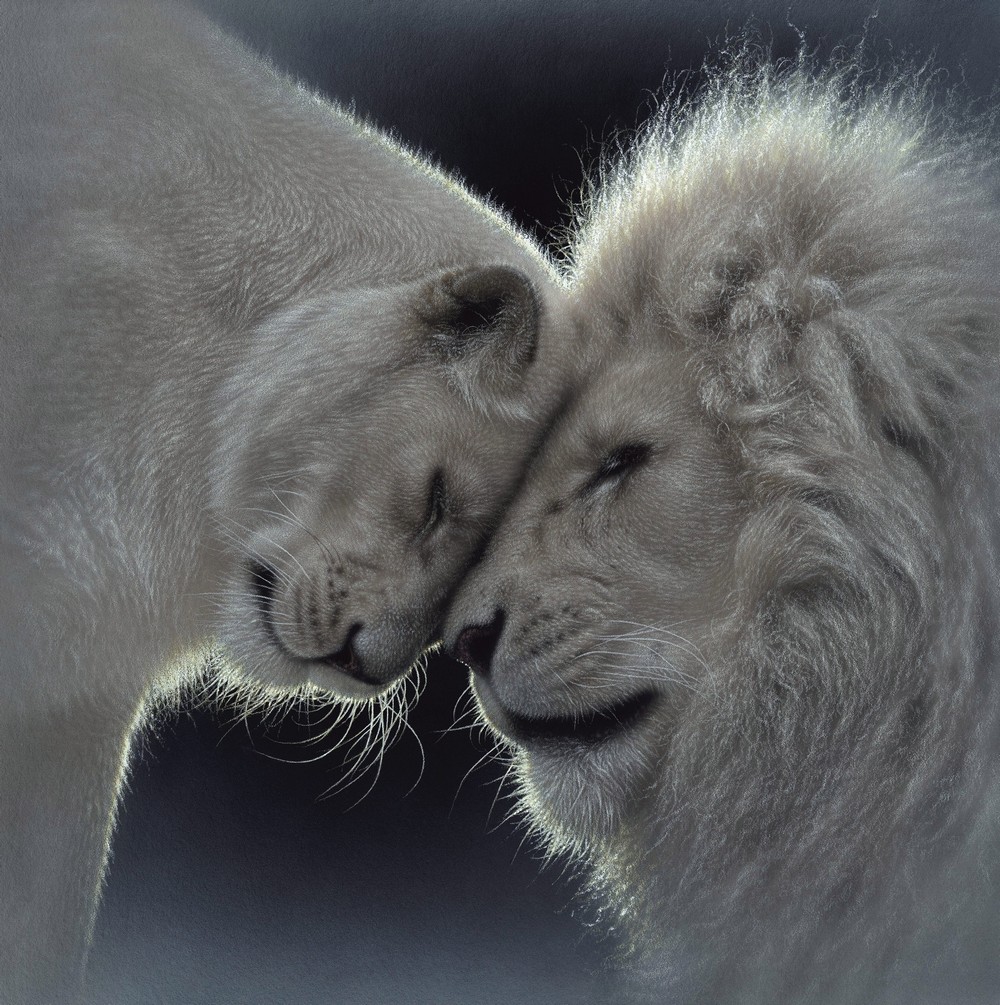



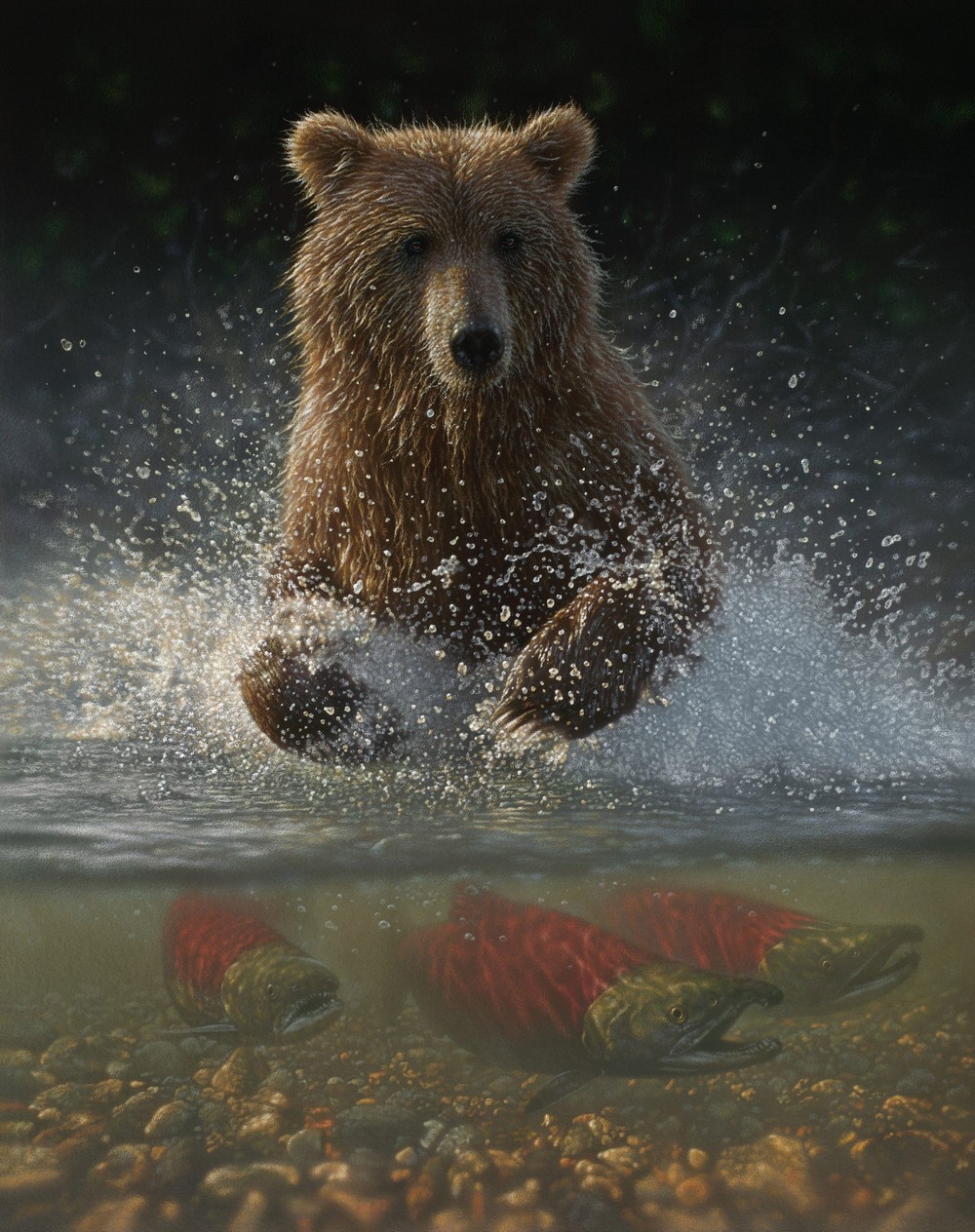
Thursday, February 18, 2021
LIVE LIFE - by Livelovelaugh

